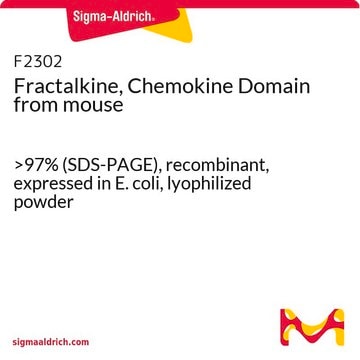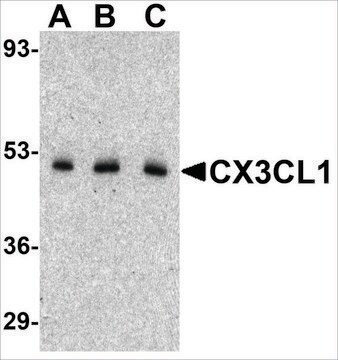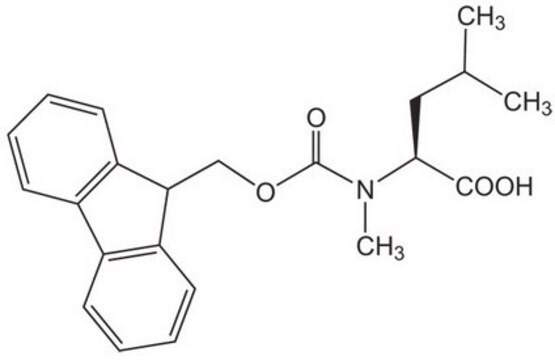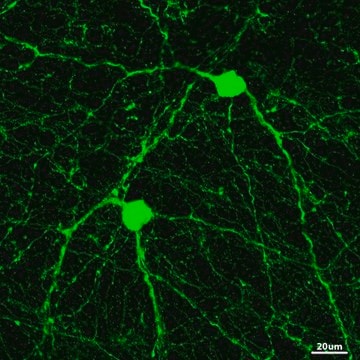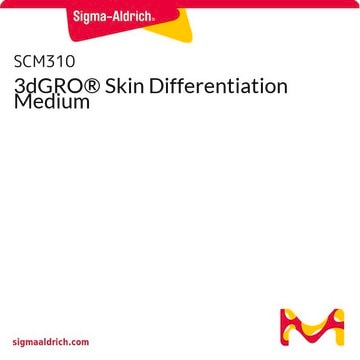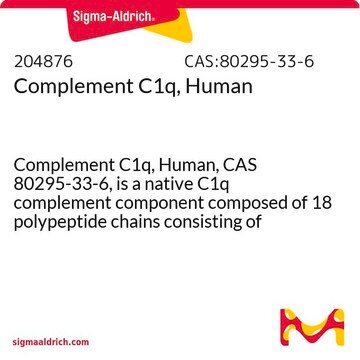F135
Fractalkine, Extracellular Domain human
≥97% (SDS-PAGE), recombinant, expressed in NSO cells, suitable for cell culture, lyophilized powder
Synonym(s):
CX3CL-1, Neurotactin
Sign Into View Organizational & Contract Pricing
All Photos(1)
About This Item
Recommended Products
biological source
human
Quality Level
recombinant
expressed in NSO cells
Assay
≥97% (SDS-PAGE)
form
lyophilized powder
potency
22.62 ng/mL
mol wt
~90 kDa
packaging
pkg of 25 μg
storage condition
avoid repeated freeze/thaw cycles
technique(s)
cell culture | mammalian: suitable
impurities
endotoxin, tested
UniProt accession no.
storage temp.
−20°C
Gene Information
human ... CX3CL1(6376)
General description
CX3CL1 (chemokine (C-X3-C motif) ligand 1) or fractalkine is a membrane protein, which is the only member of CXC3 family. Its chemokine domain (CKD) anchors it to the cell membrane through its mucin-like stalk. It acts as a ligand for the G-protein coupled receptor CX3CR1, which is found on smooth muscle cells, T-cells, natural killer (NK) cells and monocytes. Fractalkine is expressed on epithelial, endothelial and smooth muscle cells and neurons.
Biochem/physiol Actions
CX3CL1 (chemokine (C-X3-C motif) ligand 1) or fractalkine, along with CX3CR1 is involved in various disorders such as atherosclerosis, multiple sclerosis, neuropathic pain and rheumatic disorders. It facilitates the proliferation and survival of primary human vascular smooth muscle cells in an epidermal growth factor receptor (EGR)-dependent manner. It plays an essential role in cell survival and promotes the survival of cells such as monocytes, T-cells and microglia. In humans, it is thought to be involved in atherogenesis, and thus, might have potential as a target in treatment of cardiovascular disease. In patients with sickle cell disease (SCD), the serum levels of this chemokine is increased, thus implicating it in the pathogenesis of inflammation associated with SCD.
Physical form
Lyophilized from a 0.2 μm-filtered solution in PBS containing 50 μg bovine serum albumin per 1 μg of cytokine
Analysis Note
Biological activity is measured by its ability to chemoattract freshly isolated peripheral blood lymphocytes or mouse BaF/3 cells transfected with hCX3CR-1.
Storage Class Code
11 - Combustible Solids
WGK
WGK 3
Flash Point(F)
Not applicable
Flash Point(C)
Not applicable
Personal Protective Equipment
dust mask type N95 (US), Eyeshields, Gloves
Certificates of Analysis (COA)
Search for Certificates of Analysis (COA) by entering the products Lot/Batch Number. Lot and Batch Numbers can be found on a product’s label following the words ‘Lot’ or ‘Batch’.
Already Own This Product?
Find documentation for the products that you have recently purchased in the Document Library.
Selma Unal et al.
International journal of hematology, 101(2), 114-118 (2014-12-07)
In the present study, we examined the role of fractalkine (Fkn), a member of the chemokine family, in the pathogenesis of sickle cell disease (SCD). Eighty-seven children with sickle cell disease and 55 healthy children were enrolled in the study.
Jian Wang et al.
Molecular medicine reports, 24(6) (2021-10-06)
Angina pectoris is cardiac pain that is a common clinical symptom often resulting from myocardial ischemia. Spinal cord stimulation (SCS) is effective in treating refractory angina pectoris, but its underlying mechanisms have not been fully elucidated. The spinal dorsal horn
Gemma E White et al.
Arteriosclerosis, thrombosis, and vascular biology, 34(12), 2554-2562 (2014-11-02)
The CX3C chemokine fractalkine (CX3CL1) has a critical role in the development of atherogenesis because apolipoprotein-E-deficient mice lacking CX3CL1 or its receptor CX3CR1 develop smaller plaques and polymorphisms in CX3CR1 are associated with altered risk of cardiovascular disease. CX3CR1 is
Our team of scientists has experience in all areas of research including Life Science, Material Science, Chemical Synthesis, Chromatography, Analytical and many others.
Contact Technical Service